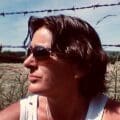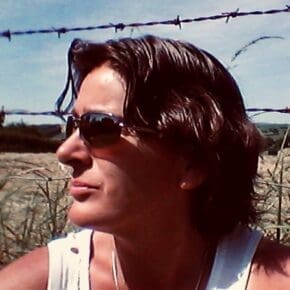Q – Hi Natasha, and thanks for joining us. It’s easy to see the link between ecofiction and dystopian fiction, especially with all the gloomy climate news, but how would you say the two genres differ?
Natasha Carthew – Thanks for having me! I think eco-fiction tends to be more factual, and that’s why my work falls into dystopian — there’s also more scope to have fun and change things up a bit. Life’s too short for facts!
I’m only kidding, but I really love to make stuff up. That’s the fun of being a writer.
Q – I would love to hear more about your writing process, particularly the way you write outside. How does the location you write in affect the work?
NC – I write the first drafts outside, and the environment deeply affects what I write. It’s great way to tap into all your senses and memories.
Writing outside can really help with characters if you spend time observing others, watching their mannerisms and listening to what they say. Ask questions of them: Why are they dressed as they are? Where have they been? Where are they going?
Listening is also great for understanding the rhythms of how folk speak and communicate with each other.
“Freedom and inspiration — that’s what wild writing is all about”
– Natasha Carthew
Q – Would it be fair to say that writing outdoors is a bit like an artist with a sketchbook, writing ideas, paragraphs and observations, that are then fleshed out at home?
Or do you do longer, more structured writing outside too?
NC – Good question! Both of the above, but absolutely we’re like visual artists. As writers, we are also collectors, and outside in different locations is where you get to do your best work.
Freedom and inspiration – that’s what wild writing is all about.
Q – You write in a number of different formats, from poetry to Young Adult (YA) fiction. Have you ever experienced any issues with that in terms of marketing or finding representation?
NC – I was very lucky to get an agent straight away, and the marketing has always been somebody else’s job! I’m also lucky to be published by two separate publishers, so the YA and literary fiction worlds don’t cross too much.
Saying that, I’m touring the UK this year talking about themes and issues in both my new books – just to keep it simple!
To be honest though, my agent didn’t know where to place my first novel Winter Damage. We had interest from a number of kids’ and adult publishers, but Bloomsbury made the best offer and their history in YA was good, so we went with them in the end.
I have always been a writer; it was never a conscious choice, because it was something I always did.
– Natasha Carthew
Q – How does the process for publishing poetry differ from long-form fiction?
NC – My first poetry books were with small presses, and then Flash Reckless went with OnlyWomen Press.
Poetry was a long haul, submitting to magazines and the like until I had a full collection, and then I started to send off to publishers who published similar work.
It’s useful to note that with both fiction and poetry it’s always good to know what the editors are into, and what writers they talk about.
Q – Are you still running your wild writing workshops?
NC – I’m still running workshops as part of the tour, and the next one is at the Port Eliot Festival in Cornwall in July.
Q – Who are your literary influences, and what made you want to start writing?
NC – Cormac McCarthy, Dorothy Allison, John Steinbeck, Daniel Woodrell – I’m a massive fan of ‘Grit Lit’! I have always been a writer; it was never a conscious choice because it was something I always did.
I still have a box of ‘books’ that I wrote whilst I was primary-school age, and before I could write I told stories that went on for hours to keep myself from going to bed.
Cornwall is definitely a main character in my work.
– Natasha Carthew
Q – Which comes first for you, setting or character?
NC – I always see my character in the setting, and it’s always been like that for me. Cornwall is definitely a main character in my work.
Q – I’ve found getting the voice right for teenage characters can be tricky. Do you have any tips or advice on how to develop this?
NC – I believe a teenager’s voice is no different from anyone else’s. That’s the mistake a lot of people make. It has to be truthful and heartfelt, the same way you would talk or think or wonder about things.
The only difference is you’ve got to cut the swearing if you’re writing YA – I had to delete 50-odd ‘f**ks’ for my first book. However, that made me a better writer because I had to find other words!
Q – Do you have any tips for getting to the end of the dreaded first draft?
NC – I would say just to sketch it out and get your words down, because once you start editing from the beginning it will all fall into place anyway. The second edit is when it all makes sense, the first is pure instinct.
Just sketch your first draft and get your words down, because once you start editing from the beginning it will all fall into place anyway.
– Natasha Carthew
Q – Do you do a lot of plotting before starting to write, or do you let the story shape itself?
NC – I’ve got ADHD so without a plot I’d be all over the place, but for me the plot has a lot to do with the feel, the shape, the colours and textures.
If you create a world specific to your book, it’s easier to infiltrate, even if you’re not feeling it that day. Once a rough plot is in place, you can let your imagination go wild!
Q – Natasha, you’ve given us some great insights. Thank you.
NC – Thank you!
























